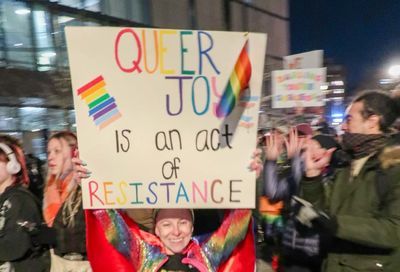American Academy of Pediatrics calls for “gender-affirming” approach to treating transgender youth
Both medical providers and parents can create accepting environments that lead to better health outcomes, statement says

The American Academy of Pediatrics has released a policy statement for parents and clinicians caring for transgender and gender-diverse children and adolescents, recommending that they be granted access to “gender-affirming” care.
“In its dedication to the health of all children, the American Academy of Pediatrics strives to improve health care access and eliminate disparities for children and teenagers who identify as lesbian, gay, bisexual, transgender or questioning (LGBTQ) of their sexual or gender identity,” the statement reads.
“Despite some advances in public awareness and legal protections, youth who identify as LGBTQ continue to face disparities that stem from multiple sources, including inequitable laws and policies, societal discrimination, and a lack of access to quality health care, including mental health care,” the statement continues. “Such challenges are often more intense for youth who do not conform to social expectations and norms regarding gender.”
Among the recommendations made by the AAP are: transgender and gender-diverse children, their parents, caregivers, and siblings should be allowed to access family-based therapy and support; transgender youth have the right to be referred to and treated according to their gender identity; and insurance plans should cover transition-related care, including hormones and even potential surgery, that have been ruled medically necessary.
The AAP recommends that medical providers who work with transgender children advocate for policies and laws that recognize their patients’ gender identities and protect them from harassment, exclusion, or bullying.
The AAP also recommends, as part of the “gender-affirming care model,” that parents play a role in ensuring the well-being of their children, noting: “Supportive involvement of parents and family is associated with better mental and physical health outcomes. Gender affirmation among adolescents with gender dysphoria often reduces the emphasis on gender in their lives, allowing them to attend to other developmental tasks, such as academic success, relationship building, and future-oriented planning.”
“We know that family and community support are essential for any child’s healthy development, and children who are gender-diverse are no different,” said Jason Rafferty, the lead author of the policy statement. “What is most important is for a parent to listen, respect and support their child’s self-expressed identity. This encourages open conversations that may be difficult but key to the child’s mental health and the family’s resilience and well-being.”
Population-based surveys estimate that 0.7% of teens aged 13 to 17 are transgender, according to the AAP. Past studies have indicated that rates of attempted suicide and suicidal ideation are particularly high among transgender youth.
By affirming a youth’s gender identity and expression, parents and medical providers can potentially reduce feelings of alienation and combat problems like depression, anxiety, eating disorders, substance abuse, and self-harm — which are higher among transgender youth than their cisgender peers.
The Human Rights Campaign praised the AAP’s decision to issue the statement.
“This statement by the American Academy of Pediatrics further reinforces the medical and moral imperative to support transgender and gender-diverse youth,” Ellen Kahn, the director of the HRC Foundation’s Children, Youth and Families Program, said in a statement. “Embracing, loving, and protecting transgender and gender-diverse youth can be life-affirming and life-saving.
“Pediatricians have a critical role to play in both providing care to patients and in advocating for protections that support the mental and physical health of the public, and today’s statement by the AAP continues their long record of supporting the health of all youth.”
Support Metro Weekly’s Journalism
These are challenging times for news organizations. And yet it’s crucial we stay active and provide vital resources and information to both our local readers and the world. So won’t you please take a moment and consider supporting Metro Weekly with a membership? For as little as $5 a month, you can help ensure Metro Weekly magazine and MetroWeekly.com remain free, viable resources as we provide the best, most diverse, culturally-resonant LGBTQ coverage in both the D.C. region and around the world. Memberships come with exclusive perks and discounts, your own personal digital delivery of each week’s magazine (and an archive), access to our Member's Lounge when it launches this fall, and exclusive members-only items like Metro Weekly Membership Mugs and Tote Bags! Check out all our membership levels here and please join us today!






















You must be logged in to post a comment.